Headless architecture is a hot subject, especially when it comes to content management. Half of IT teams agree that headless architecture will become the “norm” in the content management industry.
For ecommerce businesses, the headless setup seems particularly attractive. It solves vexing problems:
- Сonstrained multi-channel content management
- Low content reuse
- High dependency on IT teams
- Inability to personalize content across markets
But with so many vendors on the market, choosing the right headless content management system (CMS) is an enormous task, even more so if you have an enterprise retail footprint.
As a BigCommerce software development partner, Edvantis can see and work with various tech stacks. We decided to resurface some of our research into the leading headless CMS vendors on the market to help you narrow your options.
Best Ecommerce Headless CMS
Generally, most headless CMS will offer essential content management features, some degree of multi-channel publishing capabilities, content staging functionality, security tools, and native connectors for other business apps.
But to cater to the dynamic needs of ecommerce businesses, a CMS must do more than the bare minimum. Here are top performers that rise to the challenge.
Contentful
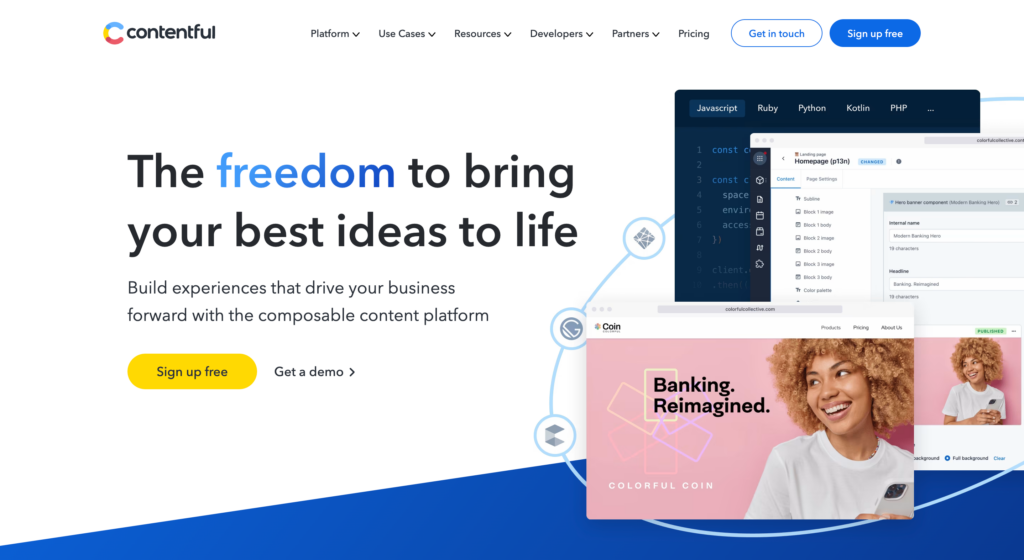
Contentful is a framework-agnostic composable content management system. Composable means that Contentful has an API-first architecture, which allows you to deploy content and other digital assets in any combination across multiple customer channels and touchpoints.
On top of basic content management features, Contentful offers Studio – a set of advanced apps for content presentation, scheduling, preview, and reuse across marketing campaigns.
Instead of a WYSIWYG editor, Contentful offers a content modeling experience – an approach to categorizing the content into custom types and elements to reflect content strategy better. Also, to accelerate time-to-market and streamline migration, the CMS has Next.js starter templates.
Select Retail Clients: Shiseido, U.S. Polo Association, Kärcher
Contentful Reviews
On Gartner, large ecommerce businesses praised Contentful’s intuitive interface, robust integration features, and complete control over their content models. Other selling points are the autosave feature, version control, easy-to-build page layouts even for non-techies, and an impressive set of integrations with other business software.
Teams used to traditional CMS face a steeper adoption curve because Contentful offers a different content staging experience. Some merchants have complained about long loading times for multi-level accounts and complex landing pages.
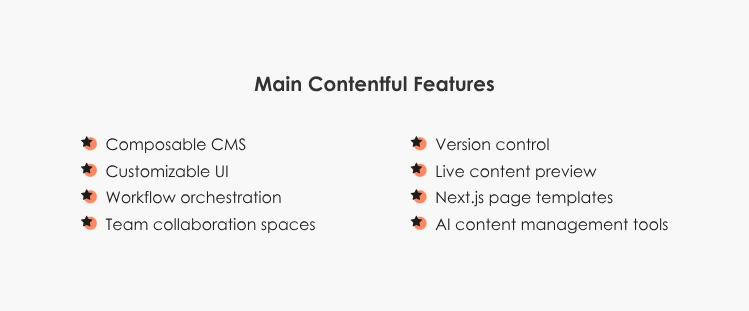
Extensions and Integrations
Contentful offers a high level of extensibility, outperforming its competitors. This ecommerce CMS platform has pre-built connectors with popular MarTech apps and ecommerce engines. A premade integration with BigCommerce is available via Contentful Marketplace if you want to run headless ecommerce operations.
Contentful also offers handy automation. You can connect individual apps to cross-share data and implement end-to-end process execution. Using Contentful’s tools and SDK, retailers can extend their CMS with new integrations and customize the UI to better meet users’ needs.
Magnolia
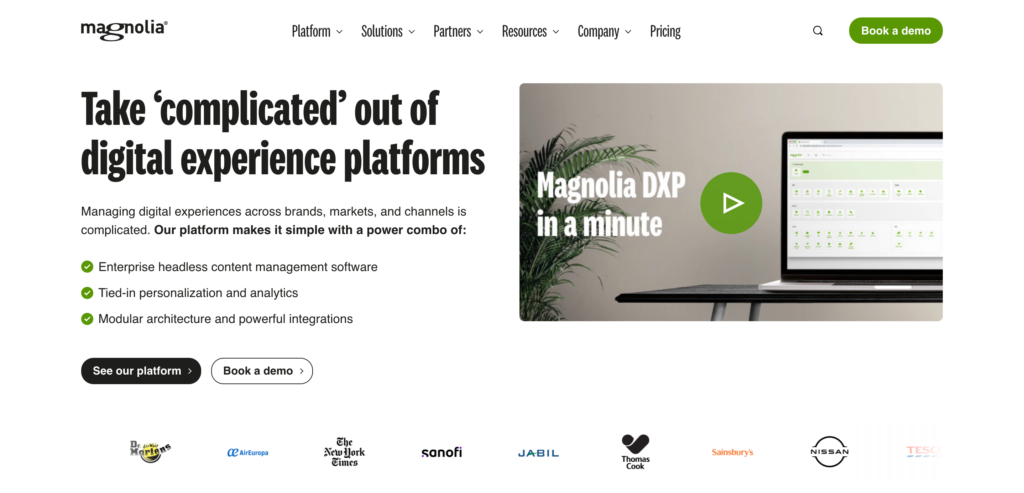
Magnolia is an enterprise-grade open-source headless CMS with modular, API-driven architecture. In simpler terms, the platform has open-source code, premade components, and product features available out of the box.
You can self-host Magnolia on-premises or opt for a managed cloud deployment. The PaaS version includes extra performance optimization perks like a CDN, load optimization service, premade CI/CD pipelines for rapid deployment, and other services for managing scalability and performance.
Magnolia headless CMS is a collection of plug-and-play apps you can mesh together to design personalized content management workflows. The three core solutions for content management are Content App, Stories App, and Pages App.
- The Content app provides basic content management functionality structuring and simple template-based editing.
- The Stories App allows marketing teams to create custom content experiences using premade building blocks and move beyond the usual content hierarchy.
- The Pages App enables marketers to build landing pages and organize the site’s hierarchy. Using different templates, they can manage page blocks as they see fit.
For Software Developers, Magnolia offers a set of tools called Headless Accelerator to streamline development work and accelerate headless adoption. Headless Accelerator provides pre-built UI patterns and web components that Software Developers can adapt to any front-end technology and reuse for any touchpoint. Magnolia allows custom work in any integrated development environment your tech team selects.
Select Retail Clients: Tesco, Sainsbury’s, Bauhaus
Magnolia Reviews
Multi-brand ecommerce stores on Gartner highlighted Magnolia’s extensibility and the ease of apps/integration replications for separate projects. One adopter in the pharmaceutical retail market especially praised Magnolia’s Sandbox environment for doing pre-launch content testing. The company also noted excellent Visual Studio compatibility, which allows them to embed custom code into Magnolia without any exports.
Some reviewers commented that Magnolia might be prone to latency issues when multiple workplaces get split into heavy nodes or published content includes many elements (namely, more than 2000 items).
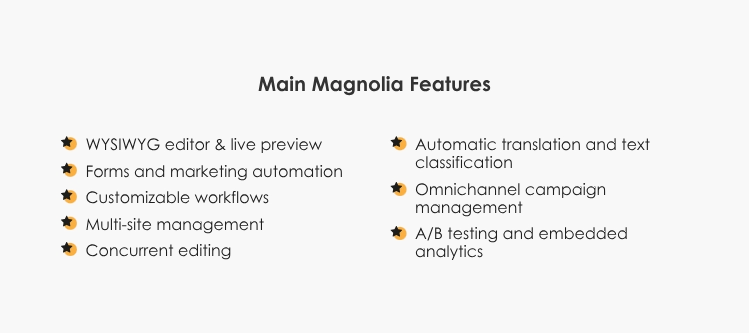
Extensions and Integrations
Magnolia has an extensive marketplace of pre-built connectors like Slack, Adobe Analytics, Microsoft Sharepoint, WeChat, SAP Commerce, and BigCommerce. There are two BigCommerce integrations: the basic one (connects products, shopping cart, and checkout) and an extended one (available in the Enterprise plan).
If you need to integrate third-party or custom apps, Magnolia lets you do so in two ways: with Java and Light Integrations. Selecting the first option gives you complete control over your integration but requires extensive Java programming skills. Light Integrations (LI) are limited in their use cases (e.g., no option for ecommerce integration). Still, non-Java Developers can use LI techniques to enable remote content access, trigger notifications, alter UI, or send metrics from analytics platforms to your Magnolia app.
Contentstack
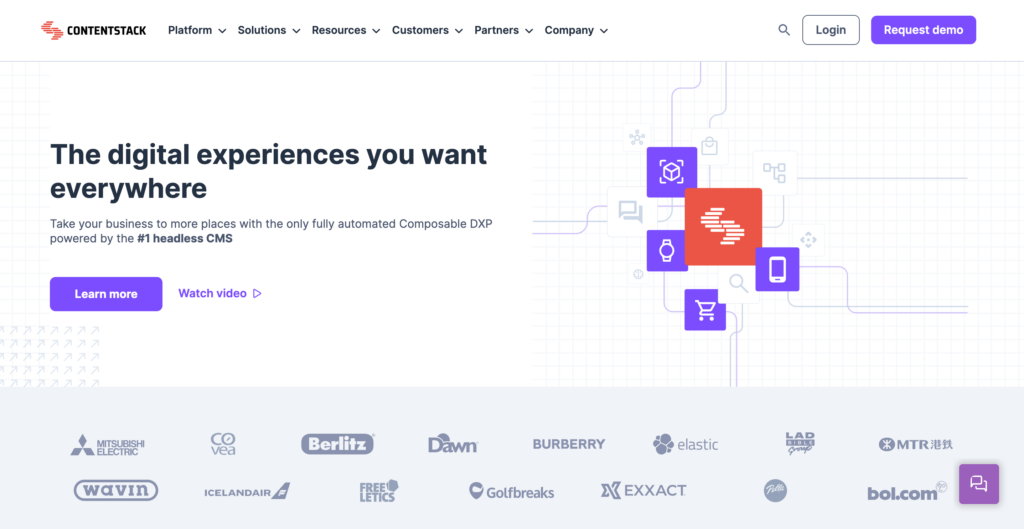
Contentstack is a headless CMS platform based on a flexible, composable architecture. It offers a drag-and-drop interface for content design, flexible workflows, live content preview, and separate workstreams for teams to operate in parallel.
Along with headless CMS, Contentstack has two supporting products: Contentstack Launch and Automation Hub.
- Contentstack Launch offers front-end hosting services for customers who use the vendor’s CMS. With Launch, you can retrieve your custom code from GitHub and deploy your website with minimum or no downtime.
- Contentstack Automation Hub allows users to create no-code integrations between different business apps to automate workflow execution.
A Forrester study noted that Contentstack delivers 295% ROI over three years after adoption. The ROI comes in the form of increased conversion rates, lower development time, and faster time-to-publishing for new content among enterprise clients.
Select Retail Clients: Cartier, Burberry, Pella
Contentstack Reviews
Enterprise merchants on Gartner talk highly about Contentstack’s robust native features, convenient publishing to mobile apps, intuitive authoring interface, and the ability to publish content in batches.
However, one adopter from the retail sector has noted that there’s a need for multiple publishing steps when localizing content (in their case — 40 languages).
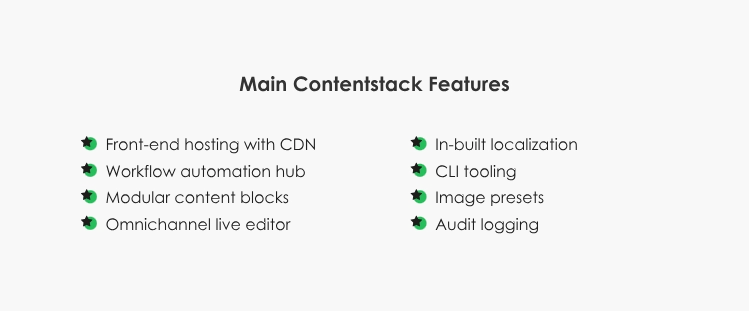
Extensions and Integrations
You can extend Contentstack in two ways: via premade Marketplace connectors and Automation Hub. Contentstack Automation Hub also relies on premade connectors (e.g., ChatGPT, Aprimo, Heroku) and lets you easily integrate them with CMS using a drag-and-drop tool. Moreover, it allows you to connect two or more apps, share data between them, and automate their workflows.
BigCommerce connector is available but only lets you manage product catalogs and categories. For a more extensive connector, contact a BigCommerce-certified partner. Contentstack also offers a variety of APIs for merchants to integrate tools not included in Automation Hub. Users can develop custom apps using the available SDKs.
Storyblok
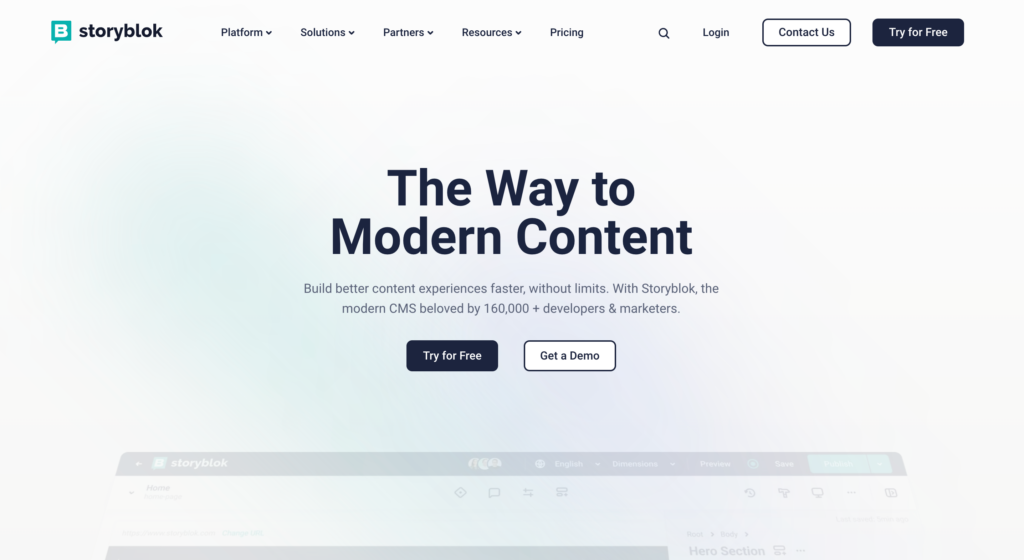
Storyblok is a cloud-native composable CMS embedded with content authoring, digital asset management, and content modeling functionality. Apart from websites, ecommerce storefronts, and mobile apps, you can deliver your content to smart screens, POS, Intranet, and Extranet.
Storyblok divides its offerings into three groups based on their purpose:
- Content Creation offers full-cycle, collaborative content management functionality
- Content Operations help build centralized content repositories for effortless organization and management
- Audience Experience functionality helps with delivering, localizing, personalizing, and testing omnichannel content
A Forrester study says enterprise Storyblok users got a 582% ROI within three years of adoption, resulting from a faster time-to-market and increased efficiency of a deployment setup. Amongst the benefits adopters experienced were frequent updates, increased average time spent on a website, and improved loading times.
Select Retail Clients: dm-drogerie markt, Adidas, Marc O’Polo
Storyblok Reviews
Reviewers from Gartners appraised Storyblok’s visual editor with real-time preview, in-built collaboration tools, a great selection of content templates, and tools for omnichannel customer journey optimization. One client from retail singled out the convenience of Storyblok’s content models that provide a well-defined hierarchy between content types.
However, being a relatively young company, Storyblok has fewer premade integrations than other headless CMS. One enterprise adopter discussed Storyblok’s incompatibility with some solutions in their stack.
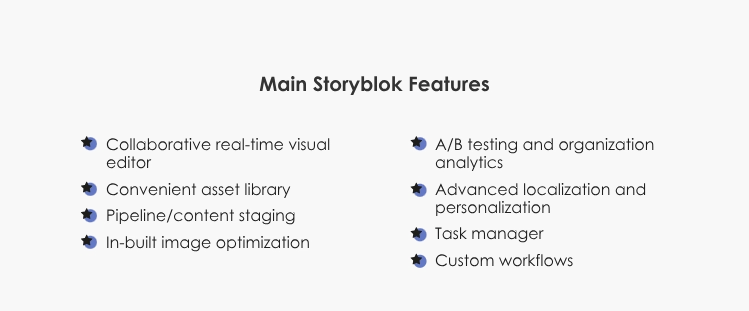
Extensions and Integrations
Storyblok App Directory has premade connectors with popular tools like Semrush, Bynder, Cloudinary, Optimizely, and Netlify. The integration with BigCommerce is available as a plugin within BigCommerce Enterprise and Enterprise Plus plans.
Storyblok’s API-first infrastructure allows Retailer Developers to integrate any third-party app, customize API response calls, or set up custom workflows. Since Storyblok is technology-agnostic, you can use any front-end framework or solution.
Extending Storyblok’s native functionality is possible by either creating custom applications (for custom dashboards) or using field-type and tool plugins (to add functionality to the visual editor).
Agility CMS
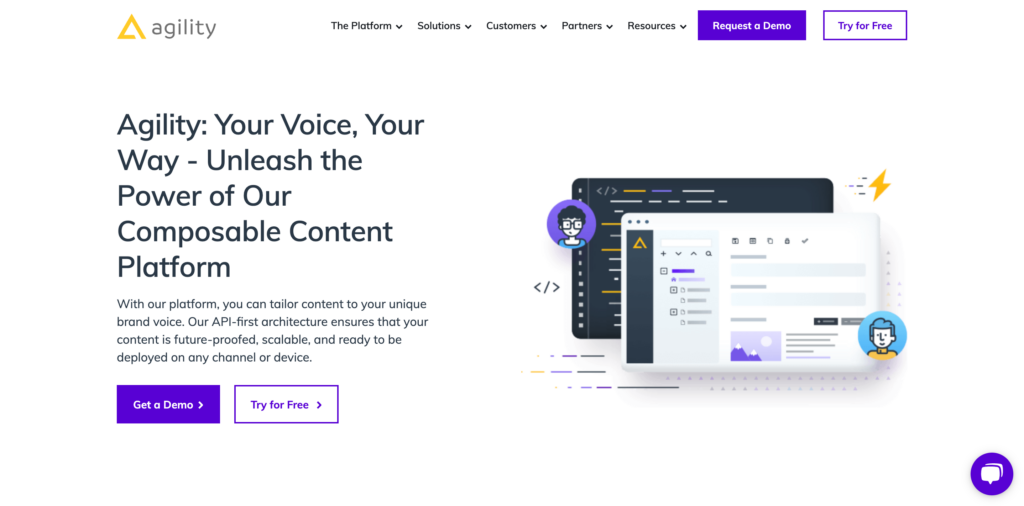
Agility CMS takes a content-first approach to its architecture and combines the API-driven flexibility of headless CMS with a more familiar UI of a CMS. So, there’s a faster adoption curve.
Apart from advanced content management functionality and API-driven extensibility, Agility CMS has three more standout offerings:
- SEO toolkit. Automatically generates SEO data, suggests on-page optimization steps, and provides baseline analytics about page loading times with Google PageSpeed Insights.
- Product management helps build better information architecture, manage content hierarchies, create custom pages using pre-built blocks, and map relationships between different assets.
- The omnichannel content hub is a central repository for managing and reusing content across all your digital channels.
Select Retail Clients: Shoppers Drug Mart, Mitsubishi, Compass Group
Agility CMS Reviews
Reviewers from Gartner positively described Agility’s seamless editing experience, convenient content publishing tools, and robust information architecture features. One customer especially praised Agility for providing file management capabilities.
However, several enterprise ecommerce businesses also mentioned Agility CMS’s occasional performance issues and slow page loading times.
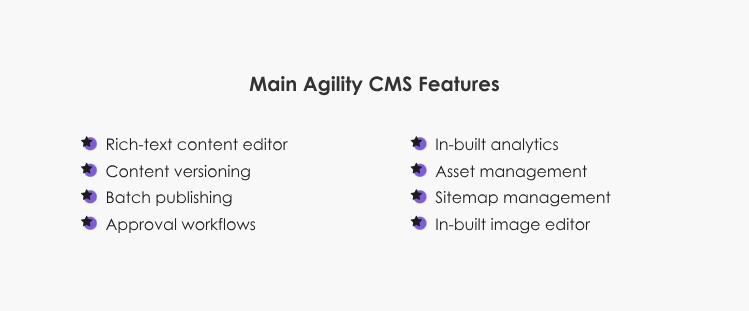
Extensions and Integrations
Agility CMS has premade integrations with Ahrefs, Google Analytics & Optimize, Vercel, Hubspot, Vimeo, Azure, and Typeform. It also provides REST API, GraphQL API, Management API, and a Sync SDK for building custom integrations. With Agility CMS, you can set up a custom process for your content production processes.
A premade integration with BigCommerce is available on Agility’s marketplace. However, it only allows connecting products with Agility’s content and pages. You may need to contact a BigCommerce development vendor to establish a more advanced integration.
Research Methodology
To create a list of the best headless CMS for ecommerce, we analyzed reviews on Gartner, TrustRadius, and G2. Using Garther, we have selected reviews from companies with 1B-10B and 10B+ in revenue from the Retail and Consumer Goods industry. Using TrustRadius, we selected reviews from enterprises from all industries. On G2, we selected reviews from enterprises operating in the Retail and Consumer Goods industries. Where available, we also used information from Forrester Economic Impact Studies.
Final Words
Merchants can fully control their digital experience when headless CMS integrates with their ecommerce backend. Your marketing teams can experiment with different content types without calling up the IT department when it comes to publishing. Moreover, the best-of-breed CMS provides extra tools for asset management, campaign monitoring, and optimization.
Retail, however, isn’t just about digital experiences. Customers expect seamless customer support, timely delivery, targeted promotions, and relevant post-purchase follow-ups. To ensure all these processes are in place, you might consider syncing your ecommerce platform and CMS with other in-demand tools – like CRM, 3PL, ERP, and Big Data Analytics Engine.
Edvantis can help retailers with headless architecture design and managed implementation of the selected CMS. Get in touch with our experts.
FAQs about Headless CMS
Headless CMS allows users to structure and reuse content across numerous channels – from websites to in-store checkouts. They give marketing teams greater autonomy when building pages since Developers are needed only for initial front-end setup and custom integrations. Developers can select any front-end technologies since many headless CMS are framework-agnostic. Also, you get preconfigured integrations with popular tools, constant system updates, and robust security.
The drawback to headless CMS is that they don’t eliminate your dependence on Developers (like traditional SaaS solutions do). It will take technical skills to create custom front-ends for your touchpoints and custom integrations if your selected CMS doesn’t offer them premade. Other disadvantages will largely depend on the CMS vendor (lack of some features/integrations, potential bugs, poor customer support, implementation, migration complexity, etc.)
Yes, ecommerce businesses benefit from omnichannel capabilities, marketing autonomy, and personalized experiences offered by headless architecture. Headless CMS often has an extensive client list of large merchants. Several CMS, including Contentful, Magnolia, and Agility, take extra steps and include composable commerce capabilities and pre-built integrations with various ecommerce platforms out of the box.
A headless CMS is a backend-only, single application for managing and reusing content. It often comes with many preconfigured connectors with other tools. DXP consists of many apps – like CMS, CRM, Business Intelligence Systems, Asset Management Systems, and sometimes even AI-driven analytics engines. DXP’s out-of-the-box capabilities are more complex and extensive (although integrations are also allowed), so they might better fit large enterprises’ needs.


